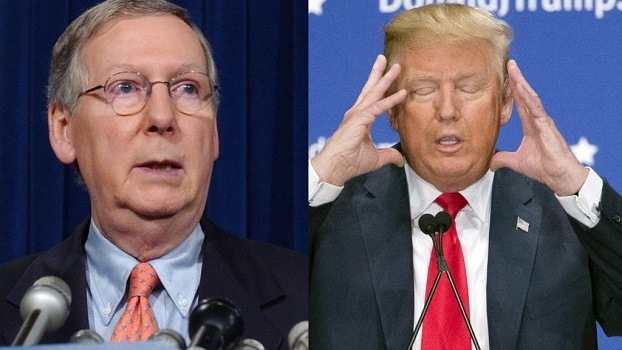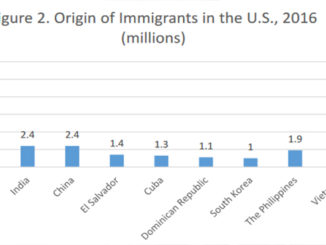
Just say no.
No, as has often been noted, is the most powerful word in the English language, a dead stop to a bad proposition. And it’s probably the best advice Democrats can heed at this point on striking an immigration deal with President Donald Trump and the Republican Congress. Just say no.
The fact is that the Republicans, who control all three branches of government, are trying to buffalo a few Democrats into breaking ranks on the so-called Dreamers and on a sweeping overhaul of the nation’s immigration laws. They’re certainly due for serious debate and revisiting, but not this way — not another rushed, in-the-dead-of-night deal bereft of public hearings and detail.
So far, it looks more like congressional Republicans throwing billions of dollars at a problem they can’t even describe accurately to placate a president who wants an election-year policy victory for his base — except that nobody knows what, precisely, that is. The best example is the wall.
The Great Wall of Trump has gone from a great big physical barrier to maybe 700 more miles of physical barriers, along with more surveillance both on the ground and in the air. At least that’s what Chief of Staff John Kelly reportedly told members of Congress. And Mexico paying the $18 billion for it? Forget about it, he told them. Apparently the truth comes home to roost, even for Trump, once it gets down to the business of governing.
More surveillance on the U.S.-Mexico border isn’t a terrible idea; a physical barrier, though, is just intended to insult people who live on the border and fuel anti-immigrant sentiment elsewhere. It would just be a 700-mile finger in the eye, particularly because the Border Patrol is openly complaining that it can’t fill all the new billets that it has already been given.
The wall is a perfect example of a hugely symbolic and utterly impractical solution in search of a problem. And that’s because the border with Mexico is not the chief source of illegal immigration anymore. The big Mexican diaspora ended more than 10 years ago and has been replaced by a relatively modest flow of people largely from Central America.
But these are comparatively small numbers: In 2017, the Border Patrol apprehended just over 300,000 people, about half in the Rio Grande Valley, according to U.S. Customs and Border Protection. That’s a fraction of the 1.6 million picked up at the height of the Mexican diaspora in 2000 — 18 years ago. And “illegal entries by Mexicans continued to decrease while those by Central Americans continued to increase,” according to Immigration and Customs Enforcement. Most of these are people fleeing violence in El Salvador.
Yet, that’s not even the half of it. The single biggest source of illegal immigration isn’t even the border with Mexico: It’s airports, according to the Center for Migration Studies. More than 750,000 people flew into the United States last year on perfectly legal visas and then just stayed, illegally, past their date of return. And what has Trump offered? A wall on the Mexican border.
The fact is that Republicans don’t really need Democratic help to keep the government running; they control both houses and the presidency. But they do need Democratic help to get a couple more wins on the board going into the midterm elections. And there are 10 Democratic senators, too, who are up for re-election in states that Trump won in 2016.
But there comes a time to put the electoral gamesmanship aside. And this is it. The latest offer in the overused name of bipartisanship, rejected by Trump in his now-infamous manner (or lack thereof), traded $18 billion for the wall in exchange for a 12-year track to citizenship for Dreamers, those protected by the Obama-era Deferred Action for Childhood Arrivals program, and a sweeping overhaul of immigration law to be named later.
Given that the administration’s immigration initiatives are ensnared in the courts and that Trump can’t go a minute without uttering a falsehood, those were hardly the hallmarks of historic legislation. They were the hallmarks of desperate politicians trying to cow enough other desperate politicians into breaking ranks for what is at best an unknown — and more likely, a bad — deal.
There is, of course, a human tragedy here: The Dreamers are stuck in limbo, barring a swift Supreme Court decision in their favor or a new Congress in the fall. And that’s bad; those are 800,000 people who find themselves in a crossfire not just about the law but, in reality, the ethnic makeup of the country. The Dreamers are a special case and deserve a singular, separate solution, maybe along the lines that U.S. Rep. Will Hurd, R-Helotes, has proposed. Hurd offered more narrow legislation to protect the Dreamers and beef up border enforcement.
Yes, it’s a risk to them. But trading their short-term relief for a dozen more years of waiting was going to be compounded, anyway, by another crackdown on immigration, both legal and illegal. First, the House was going to tear apart any comprehensive deal the Senate made on illegal immigration. Second, people like Sen. Tom Cotton, R-Ark., want to crack down on perfectly legal immigrants. Giving in to the likes of Cotton would be tantamount to giving up.
The nation’s immigration laws are long overdue for revision; that’s fine. But not this way and not with these negotiating partners. Legislation should be a practical solution, not just a political sop. So, when it comes to a grand immigration bargain with this Congress and this president right now? Recall Nancy Reagan: Just say no.
Note: this op-ed originally appeared with the title GOP immigration politics have moved far beyond the reality of U.S.
Richard Parker is a writer in Austin and the author of Lone Star Nation: How Texas Will Transform America. He is a frequent contributor to The Dallas Morning News. Twitter: @richardparkertx



